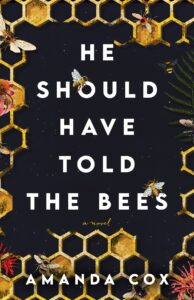By Amanda Cox, @AmandaCoxWrites
As an author with a background in counseling, there’s nothing I love more than digging deep into a character’s childhood and other defining moments–using those elements to analyze their fears and motivations to create impactful plot points.
For the most part, I find my counselor’s perspective to be helpful, but I have to remind myself that my characters don’t exist inside a constant therapy session. They shouldn’t be as aware of themselves as I am.
I must ensure that my characters aren’t in on all the knowledge I’ve collected about them!
If you likewise enjoy fleshing out the backstory, it can be tough to be judicious with what you know. After having so much fun figuring out what makes your characters tick, it’s tempting to lay all of it out there for the reader. Resist that temptation! Even though you know why your characters are choosing certain behaviors, your character shouldn’t have that information…at least not fully…not yet…not if we want our characters to read like real people.
Generally, you and I have an established way of interacting with the world and a way of thinking that is normal to us. We aren’t walking around in a constant state of reflection. Those of us who are introverts tend to be more prone to frequent introspection than our extroverted counterparts, but most of us are not in a constant state of connecting our thoughts and behavior to events in our lives. We also all have blind spots–things that other people notice about us that we are unaware of. If our goal is to create characters that feel like real people, it is important to keep this in mind.

Think about the moments in your life that caused you to stop what you were doing to analyze your thoughts, feelings, or emotions. Maybe you experienced an “inciting incident” in your life, or a person that you trusted spoke into your life and pointed something out to you that you were previously blind to. This might have resulted in denial, a moment of reflection, or an entire season in which you became more focused on personal growth. Use external elements in your plot to bring out the internal development in your characters.
As we create character arcs, we can give both experiences to our characters–small events that lead to small revelations (or maybe even denial) that prepare them for a climactic moment that comes later in the story. This is where all the work developing the character’s backstory comes into play. We can tailor the events in the story to connect in a meaningful way to the wounds our characters carry.
Trust your reader! Part of the fun of reading comes through collecting all the little crumbs the author has strategically sprinkled throughout the story. It is a far more engaging experience than reading an entire paragraph of your character analyzing their past.
So how self-aware should our characters be? They should be aware of their actions and where they have landed in life, but maybe not know why or how they got there. They shouldn’t analyze their every move, connecting it with some past event. (unless an obsession with self-analysis is their character flaw…which could be pretty entertaining) To help our characters feel authentic, it is important that they have blind spots and flaws that they aren’t fully aware of and that they don’t fully understand. Make sure you as the author are the only one holding all the information when the story begins, and be strategic with the revelations!
Beekeeper Beckett Walsh is living her dream, working alongside her father in their apiary, until his untimely death sends her world into a tailspin. She suddenly finds she must deal with a new part owner of the family business–one who is looking to sell the property. Beck cannot fathom why her father would put her into the position to lose everything they built together.
When Callie Peterson is named in the trust of a man she’s never heard of, she’s not sure what to do. Her fledgling business has just taken wing and her mother has reentered her life asking for help getting into rehab for her lifelong substance abuse issues, making Callie’s financial situation rather . . . precarious. She’s sure she has no right to someone else’s farm, but the money from the sale could solve her problems and give her the stability she’s always craved.
As these two women navigate their present conundrum, they will discover a complex and entangled past full of secrets–and the potential for a brighter future for both of them.
Amanda Cox is the author of The Edge of Belonging and The Secret Keepers of Old Depot Grocery, both of which were the Christy Award Book of the Year in 2021 and 2022, respectively. She holds a bachelor’s degree in Bible and theology and a master’s degree in professional counseling, but her first love is communicating through story. Her studies and her interactions with hurting families over a decade have allowed her to create multidimensional characters that connect emotionally with readers. She lives in East Tennessee, with her husband and their three children. Learn more at AmandaCoxWrites.com




Comments 1
Excellent post, Amanda! Thank you! A favorite tip you mentioned: “Use external elements in your plot to bring out the internal development in your characters.”
Blessings,
MaryAnn